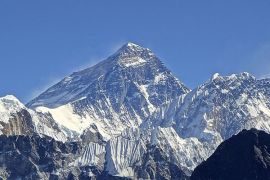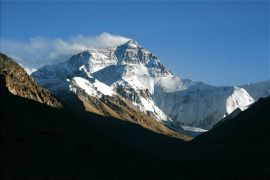However, two members of the team who climbed from the other side (southern route) of the mountain failed to reach the top. The Seven Summit Expedition Team scaling the mountain consisted of four members of Wanadri, the country`s oldest outdoor activity organisation.
The four members were divided into two groups - Iwan Irawan and Nurhuda, who climbed from the northern route (Tibet), and Ardeshir Yaftebi and Fadjri Al-Luthfi, who made the ascent from the southern face (Nepal).
The Indonesian Red-and-White flag was successfully flown on top of Mt Everest when Iwan and Nurhuda reached the peak from the northern route on Saturday (May 19, 2012) at 7:46 am local time.
In order to reach the peak of Mt Everest, which is also called "Sagarmatha Peak," the climbers went through a long process of several stages. They had to constantly coordinate with the guides who accompanied them since the beginning of the ascent.
Of the two Wanadri climbers, Iwan Irawan was the first to reach the peak, followed by Nurhuda. They were then followed by Peter, a Swedish climber, and their guides Tashi and Lakpa.
"Thank God, the Red-and-White flag has once again been flown on the peak of Everest by the climbers of the northern route," stated Ipong Witono, chairman of the world`s Seven Summit Expedition Team, in an SMS sent to ANTARA on Saturday.
Ipong expressed his thanks to all prayers conveyed by the country for the success of the team. "Thanks for the prayers, cooperation and guidance. We hope that the other group of Wanadri climbers who scaled the peak from the southern route (Nepal) on Sunday (May 20) will also pull off the same achievement. We also hope that God will bless them so that they can return home with their achievement," Ipong remarked.
He said that with their ability to reach the world`s highest peak, the climbers deserved to be called "Seven Summiters," a designation awarded those who have successfully climbed the seven highest peaks of the world. The designation is a dream for a world mountain climber.
Earlier, the Wanadri climbers during their seven summit expedition have successfully climbed to the top of the six highest peaks in six continents, namely, the Ndugu-Ndugu or Cartenz Pyramid (4,884 m) Peak in Papua, the Kilimanjaro Peak (5,895 m) of Tanzania, the Elburz Peak (5,642 m) of Russia, the Aconcagua Peak (6,962 m) of Argentina (although one climber, Gina Afriani, failed in this attempt), the Denali/McKinley Peak (6,194 m) of Alaska and the Vinson Massif Peak (4,897 m) of Antarctica.
Due to bad luck, however, the other two Wanadri climbers failed to conquer the peak of Mt Everest on Sunday. Ardeshir and Fadjri were attempting to scale the mountain from the southern route (Nepal).
The Executive Chairman of the Seven Summit Expedition, Yoppie Rikson Saragin, reported from Kathmandu on Sunday that extreme weather had been the main cause of the Wanadri climbers` failure to continue their expedition to the peak.
The bad weather compelled Fadjri Al Luthfi to descend from the Southcol Camp-IV (7,950 m) to Camp 2, and then to the Base Camp.
"Fadjri happened to stay for one night at the Southcol Camp, and he finally had to accept the decision to descend, because when he was to conduct a `summit attack` on Saturday, he faced strong winds with a speed of up to 50 metres per second.
With winds blowing at this speed, it was not safe for a climber to attempt the peak. These conditions were very different from the previous prediction that the winds would be at an average speed of 10 metres per second.
Yoppie explained that in unfriendly weather, climbers have little chance of accomplishing a `summit attack.` "At present, the climbers are taking rest at the Base Camp and awaiting their guide leader, Mr Hiro. The climbers are experiencing fatigue," he remarked.
Fardjri Luthfi was the only Wanadri climber who was able to reach and stay at the Southcol Base. Ardeshir Yaftebi had earlier returned to the Base Camp because he suffered from laryngitis.
These conditions forced the management of the Seven Summit Expedition Team to close the south route expedition and prepare the team to return to Indonesia. "As an executive chairman of the expedition, I must express thanks for all the prayers, guidance, support and cooperation conveyed to us for the realisation of the Seven Summit Expedition," Yoppie added.
The withdrawal of the climbers from the southern route means that only two of the Wanadri climbers were successful in reaching Mt Everest`s peak - Iwan Irawan and Nurhuda - who both climbed from the northern route (Tibet).(*)
Reporter: Andi Abdussalam
Editor: Aditia Maruli Radja
Copyright © ANTARA 2012







